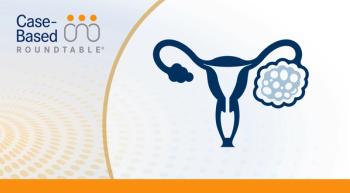
Single-Agent IO Therapy in Advanced Endometrial Cancer: PHAEDRA and DOMENICA
Focused discussion on single-agent immunotherapy in patients with advanced endometrial cancer following data from the PHAEDRA and DOMENICA clinical trials.
Episodes in this series

Transcript:
Ritu Salani, MD, MBA: The next thing I want to highlight is a study presented by Dr [Daniel] Buchanan at ASCO. And we haven’t seen the paper yet, but this study also adds to the literature. This is about the impact of cause of mismatch repair deficiency and other molecular markers on clinical outcomes with the use of durvalumab in advanced endometrial cancer in the phase 2 PHAEDRA trial [ANZGOG1601].
It was a single-arm study that looked at durvalumab, which is a PD-L1 inhibitor given every 4 weeks, and looked at the primary outcome of objective response rate. We have seen in mismatch repair deficient populations, which we’ve studied in the PHAEDRA trial, that the role of [the] single-agent checkpoint inhibitor in the recurrent setting is quite impactful.
This study looked at the mismatched repair deficient tumors. It also looked at MLH1 hypermethylation, which is a bit different or Lynch-like. It also looked at tumor mutational burden as well as some other molecular markers.
In this study, there was an interesting finding in noting that the objective response rate was much higher in those patients with Lynch syndrome or somatic mismatch repair mutations. What we saw, which has been inconsistent in the literature, is those patients with MLH1 methylation still had notable response rates, but they were much lower than with the somatic or Lynch-type mutations. This is an important finding that may highlight different subgroups within the mismatch repair deficient population. More data is going to come out on this as we continue to learn more about the role of checkpoint inhibitors in the mismatch repair deficient populations and continue to study the MLH1 methylated patients as well.
The next study in mismatch repair deficient population that I want to highlight is a randomized phase 3 trial in mismatch repair deficient endometrial cancer patients comparing chemotherapy alone versus dostarlimab in first-line advanced metastatic setting, the DOMENICA study [NCT05201547]. This is an exciting trial. This was a trial-in-progress [abstract presented by Dr Florence Joly]. In this study, she looks at replacing chemotherapy in the frontline setting. It is, once again, targeting those patients we expect to have the best responses, those mismatch repair deficient populations, and using the single-agent checkpoint inhibitor compared to chemotherapy with carboplatin and paclitaxel. If this study is positive, it may take out chemotherapy as a first-line option in these patients and replace it with a single-agent checkpoint inhibitor. This could be game-changing and adds to what we just saw with the other trials looking at checkpoint inhibitors in combination with chemotherapy. The important implications of the study are that this may have continued high success rates in regard to survival outcomes. It may also have a better toxicity profile. As we know, there are differences between immunotherapy toxicities and chemotherapy toxicities. And, most impactful, it may help manage the carboplatin and cisplatin shortage that we’re seeing nowadays and may eliminate the use of therapies that may not be necessary in that frontline setting. I am really looking forward to the study results, and I think it really will be practice-changing.
Transcript edited for clarity.




















